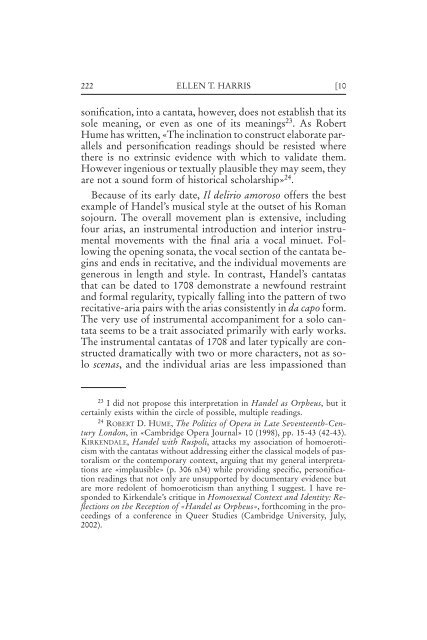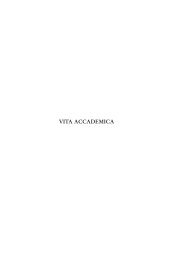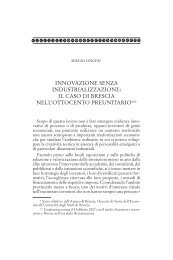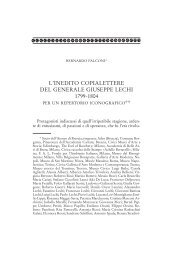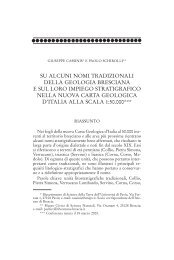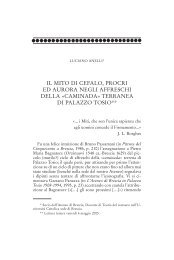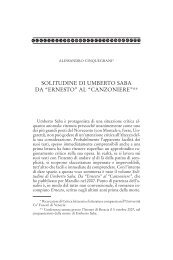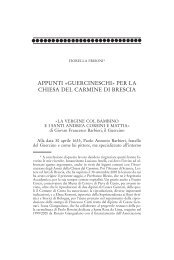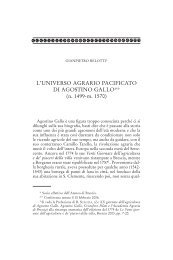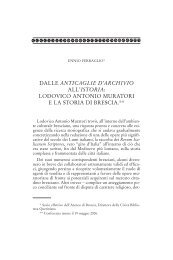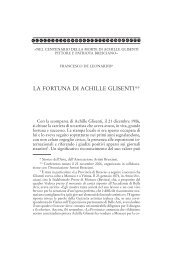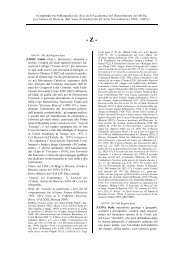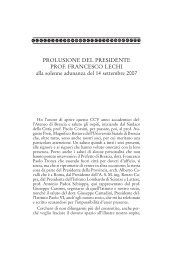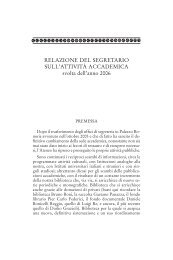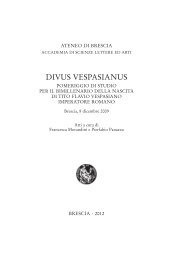do handel's cantatas matter? - BOLbusiness
do handel's cantatas matter? - BOLbusiness
do handel's cantatas matter? - BOLbusiness
You also want an ePaper? Increase the reach of your titles
YUMPU automatically turns print PDFs into web optimized ePapers that Google loves.
222 ELLEN T. HARRIS<br />
[10<br />
sonification, into a cantata, however, <strong>do</strong>es not establish that its<br />
sole meaning, or even as one of its meanings 23 . As Robert<br />
Hume has written, «The inclination to construct elaborate parallels<br />
and personification readings should be resisted where<br />
there is no extrinsic evidence with which to validate them.<br />
However ingenious or textually plausible they may seem, they<br />
are not a sound form of historical scholarship» 24 .<br />
Because of its early date, Il delirio amoroso offers the best<br />
example of Handel’s musical style at the outset of his Roman<br />
sojourn. The overall movement plan is extensive, including<br />
four arias, an instrumental introduction and interior instrumental<br />
movements with the final aria a vocal minuet. Following<br />
the opening sonata, the vocal section of the cantata begins<br />
and ends in recitative, and the individual movements are<br />
generous in length and style. In contrast, Handel’s <strong>cantatas</strong><br />
that can be dated to 1708 demonstrate a newfound restraint<br />
and formal regularity, typically falling into the pattern of two<br />
recitative-aria pairs with the arias consistently in da capo form.<br />
The very use of instrumental accompaniment for a solo cantata<br />
seems to be a trait associated primarily with early works.<br />
The instrumental <strong>cantatas</strong> of 1708 and later typically are constructed<br />
dramatically with two or more characters, not as solo<br />
scenas, and the individual arias are less impassioned than<br />
23 I did not propose this interpretation in Handel as Orpheus, but it<br />
certainly exists within the circle of possible, multiple readings.<br />
24 ROBERT D. HUME, The Politics of Opera in Late Seventeenth-Century<br />
Lon<strong>do</strong>n, in «Cambridge Opera Journal» 10 (1998), pp. 15-43 (42-43).<br />
KIRKENDALE, Handel with Ruspoli, attacks my association of homoeroticism<br />
with the <strong>cantatas</strong> without addressing either the classical models of pastoralism<br />
or the contemporary context, arguing that my general interpretations<br />
are «implausible» (p. 306 n34) while providing specific, personification<br />
readings that not only are unsupported by <strong>do</strong>cumentary evidence but<br />
are more re<strong>do</strong>lent of homoeroticism than anything I suggest. I have responded<br />
to Kirkendale’s critique in Homosexual Context and Identity: Reflections<br />
on the Reception of «Handel as Orpheus», forthcoming in the proceedings<br />
of a conference in Queer Studies (Cambridge University, July,<br />
2002).


